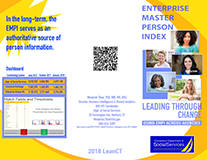Enterprise Master Person Index (EMPI)
Coordinated, accountable, patient-centered care is reliant on seamlessly orchestrated access to data and a consolidated view of an individual’s health history. Driven by its vision of a fully-integrated, person-centered system, facilitating efficient and evidence-based healthcare delivery for all its residents, DSS implemented an Enterprise Master Person Index (EMPI) in January 2016. The EMPI uniquely identifies individuals across a myriad of systems, settings and populations to enable a single, unified health record for statewide outcomes improvement and real-time health information exchange. Essentially, the EMPI serves as an enterprise solution for maintaining consistent, accurate and current demographic data, ensuring that each individual is represented once across all subscribing systems.
The EMPI serves as an authoritative source of information by instituting consistent, accurate and current demographic data on individuals receiving services from the State using an enterprise unique identifier. By encompassing accurate person identification at every point across the network, DSS is able to build a total picture of each individual for coordinated care improvements, population health initiatives, operational efficiency and treatment plan success.
Today, the EMPI is used by the state’s eligibility and enrollment system (DSS-ImpaCT), the state’s Health Insurance Exchange (HIX) system Access Health Connecticut (AhCT), and The Office of Early Childhood. EMPI is hosted by the State’s Bureau of Enterprise Systems and Technology (BEST). The state uses NextGate as its EMPI solution provider.
Currently, Phase II (2019-20) work includes 1) onboarding additional subscribing systems, 2) implementing the Relation Registry, and 3) integration with the Medicaid HIE platform (HealthShare) to support Project Notify and the Personal Health Record. Preliminary discussions have occurred with at least nine sister agencies, with six agencies expressing interest in the use of this technology. Many state agencies operate/purchase/create independent identity management solutions to support direct care delivery functions. A shared technology solution can support interoperability within and across agencies as well as support the exchange of information to coordinate services and support better care for people.
The Department of Social Services (DSS) is responsible for Health Information Technology (Health IT), including Health Information Exchange (HIE) for the State’s Medicaid population. The DSS has made steady progress on implementing its roadmap for Health IT and HIE in Connecticut focusing on Medicaid beneficiaries. Our strategic goals are aligned with Health IT vision and goals of the Office of the National Coordinator for Health Information Technology (ONC) and the Centers for Medicare and Medicaid Services (CMS). This vision is anchored in providing an integrated person-centered system facilitating, efficient and evidence-based health care delivery for all Connecticut residents.
|
Contributing System |
Oct. 2017 |
Jan. 2018 |
Apr. 18 |
Jul. 18 |
Oct. 18 |
Jan. 19 |
Apr. 19 |
Jul. 19 |
|
Dept. of Social Services |
3,048,983 |
3,079,138 |
3,099,635 |
3,128,561 |
3,157,090 |
3,175,154 |
3,200,129 |
3,217,690 |
|
Insurance Exchange (AHCT) |
1,630,595 |
1,684,210 |
1,711,135 |
1,746,502 |
1,781,589 |
1,810,846 |
1,837,613 |
1,864,012 |
|
HHC |
113 |
86,510 |
134,826 | |||||
|
YNHHS |
|
|
|
|
|
|
28,731 |
64,784 |
|
|
|
|||||||
|
Enterprise Unique IDs |
3,171,660 |
3,214,654 |
3,236,315 |
3,266,906 |
3,297,184 |
3,322,773 |
3,409,511 |
3,458,575 |
2018 LeanCT Showcase
 |
 |
| Leading Through Change Poster |
EMPI Brochure |
Updated 2/4/2020

